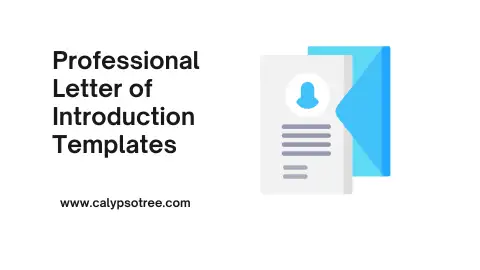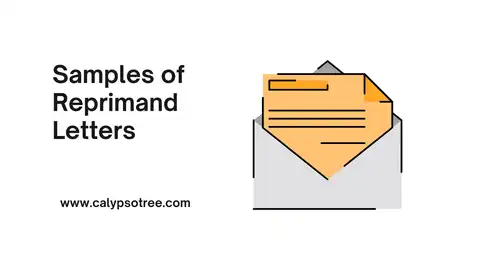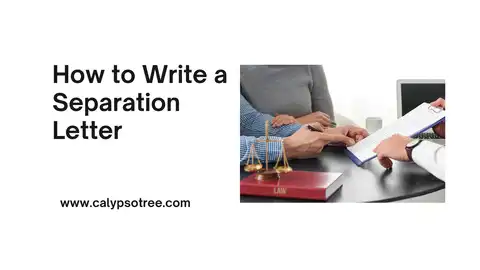Get customizable attempt to contact letter templates for debt collection, legal notices, and more. Includes a step-by-step writing guide!
Tired of trying to reach someone without success? Our free attempt to contact letter templates and easy writing guide will help you create a formal letter to get their attention and keep a record of your efforts.”
What is an Attempt to Contact Letter Template?
An attempt to contact letter template is a pre-structured document designed to provide a framework for formally communicating when you’ve been unable to reach someone via regular methods (phone, email, etc.).
Why use a Attempt to Contact Letter?
Here is Some key reasons why an attempt to contact letter is a valuable tool in various situations:
It Makes Things Official
- Proof You Tried: A letter shows you went beyond just calling or emailing. It’s a record of your efforts.
- Legal Stuff: If the issue ends up in court or gets serious, this letter proves you did your part to communicate.
- Protection: It shows you acted fairly, even if the other person claims they didn’t know what was happening.
It Sets Deadlines
- No More Waiting Games: The letter tells them exactly what you need and when you need a reply. Now it’s up to them to act.
- Gets Them Moving: A deadline makes it urgent. They can’t just ignore you forever.
- Warnings: You can say what might happen if they don’t respond (like extra fees or legal action).
It Can Be Required by Law
- Debt Collection: Sometimes there are rules you have to follow before trying to collect a debt. This letter can be one of those steps.
- Contracts: Some agreements have rules about how to give official notice. The letter helps you follow them.
- Court Cases: Lawyers often use these letters to show they tried to contact the other side.
It Can Deliver Urgent News
- You Did Your Best: If you need to tell someone important something quickly (like an event is canceled), the letter proves you tried your best to get the message to them.
- Avoiding Blame: This helps if they face problems because they didn’t get the information on time.
It Keeps Things Professional
- Don’t Get Angry: It’s frustrating when you’re ignored, but getting mad in the letter won’t help. Staying calm and firm is best.
- Looking Good: Being the reasonable one makes you look better if things get worse.
Important: An attempt to contact letter needs to be well-written and accurate. It also needs to fit the seriousness of the situation.
When Should You Use an Attempt to Contact Letter?
Dealing with a Ghosting Client:
If you’re a freelancer or run a business, you might have a client who suddenly stops responding. An attempt to contact letter can help get things back on track.
Collecting Overdue Payments:
If someone owes you money, this letter can be a step in the process of reminding them and making things official.
Dealing With Legal Stuff:
Sometimes lawyers or courts need proof that you tried to contact someone. This letter does the trick.
Sharing Urgent News:
If you have time-sensitive information someone needs to know, this letter can show that you made an effort to deliver it.
What are the essential elements to include in an attempt to contact letter?
Here’s the checklist:
- Your Contact Information: Name, address, phone, and email.
- Recipient’s Contact Information: Their details, as accurate as you can make them.
- The Date: The day you send the letter.
- Clear Subject Line: Something like “Attempt to Contact Regarding [the issue]”.
- What It’s About: Explain why you’re trying to reach them.
- History of Contact Attempts: List dates and how you tried to contact them previously (call, text, etc.).
- Call to Action: Be specific – call you back, reply to your email, etc.
- Deadline (Optional) Give them a deadline.
- Professional Closing: “Sincerely” and your signature work best.
Free Attempt to Contact Letter Templates
Get Your Free Attempt to Contact Letter Templates Here
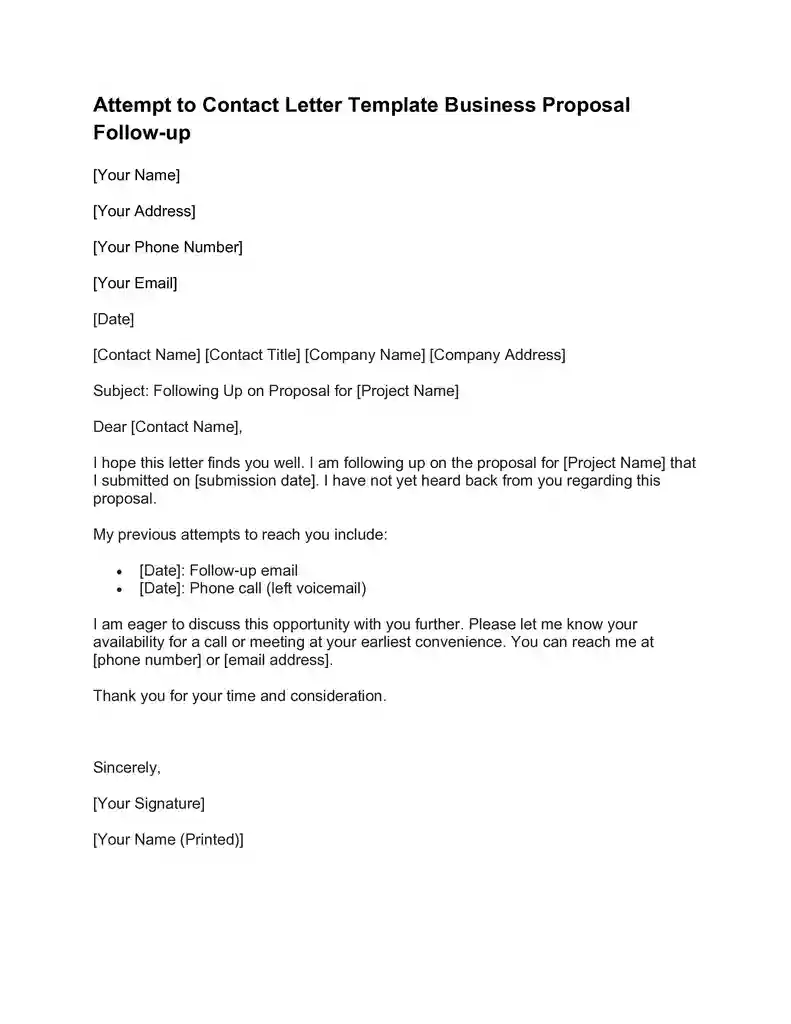
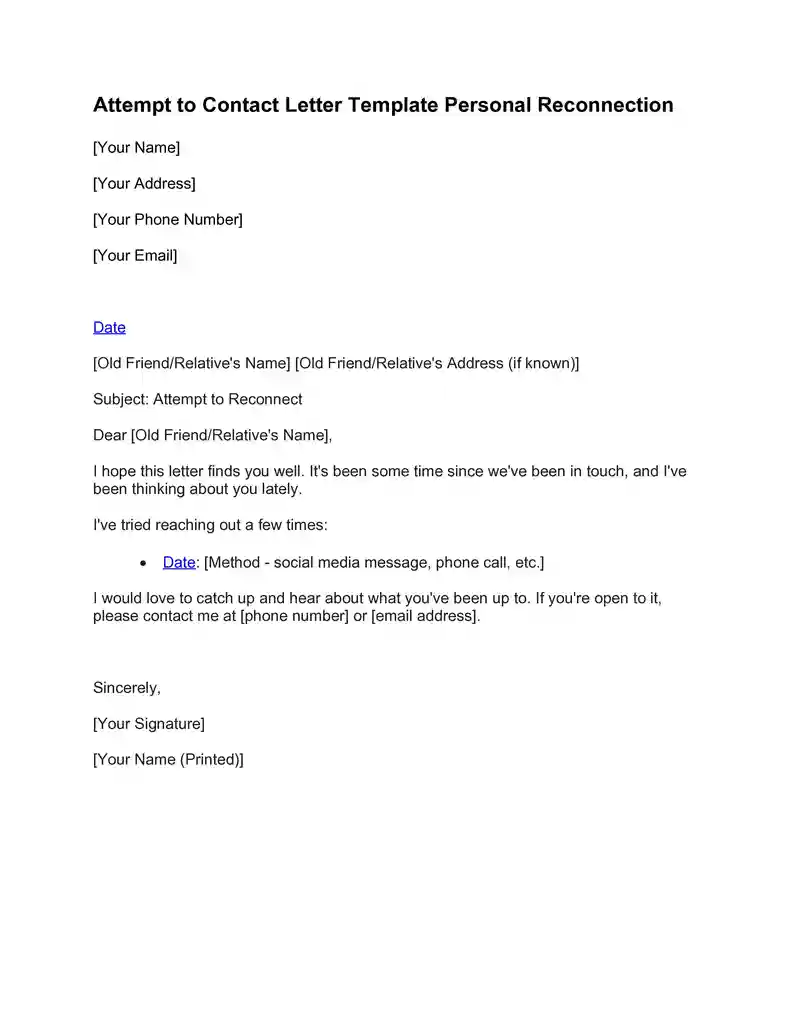
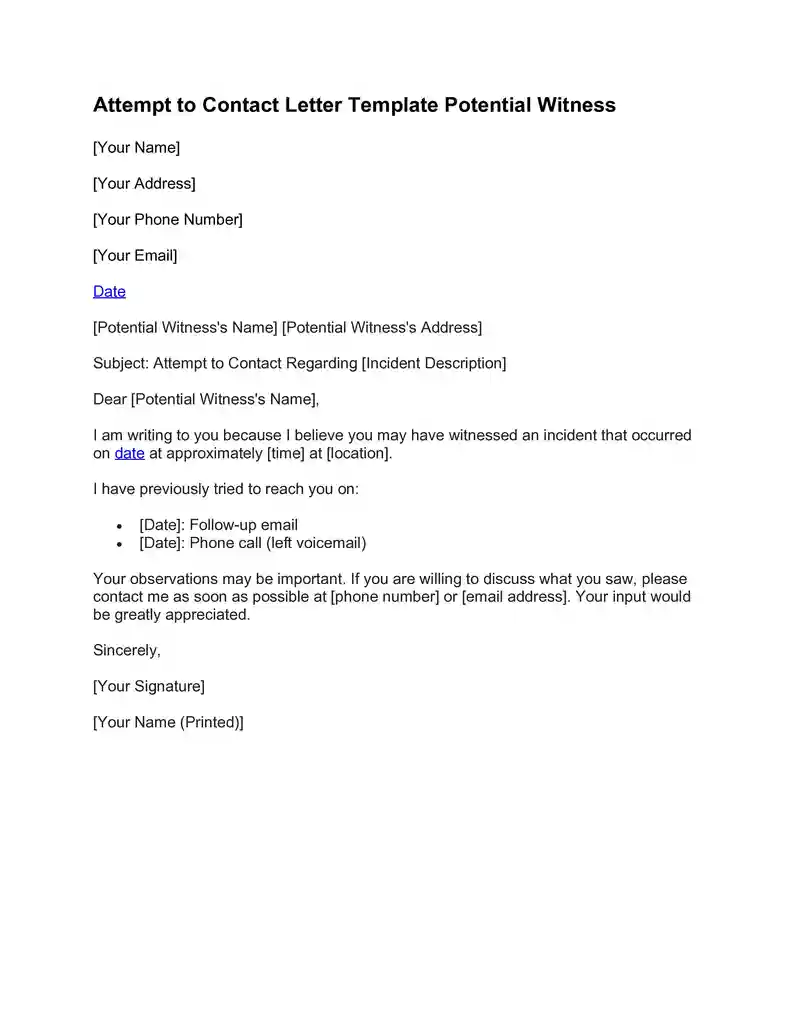
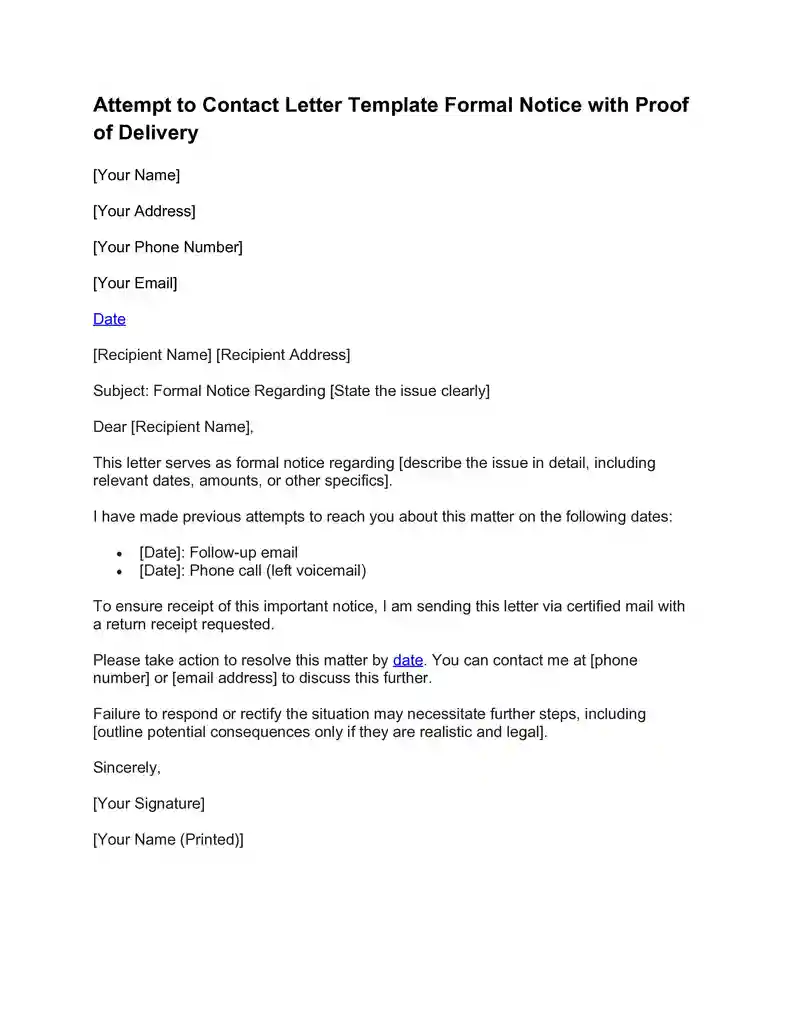
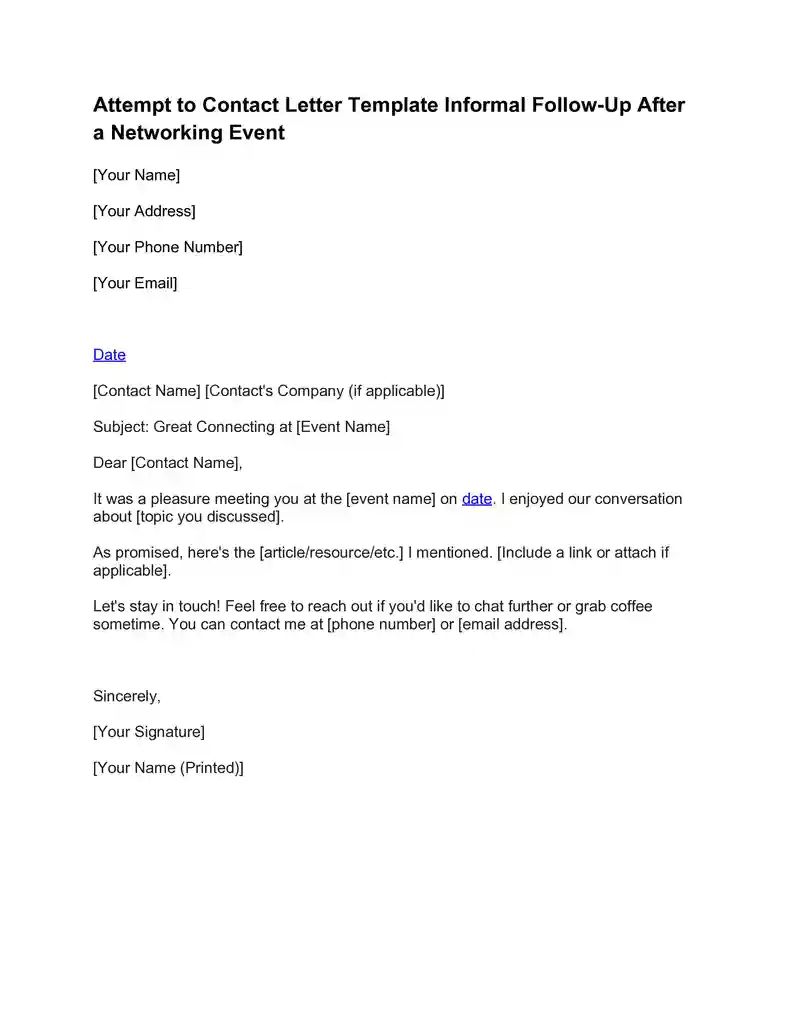
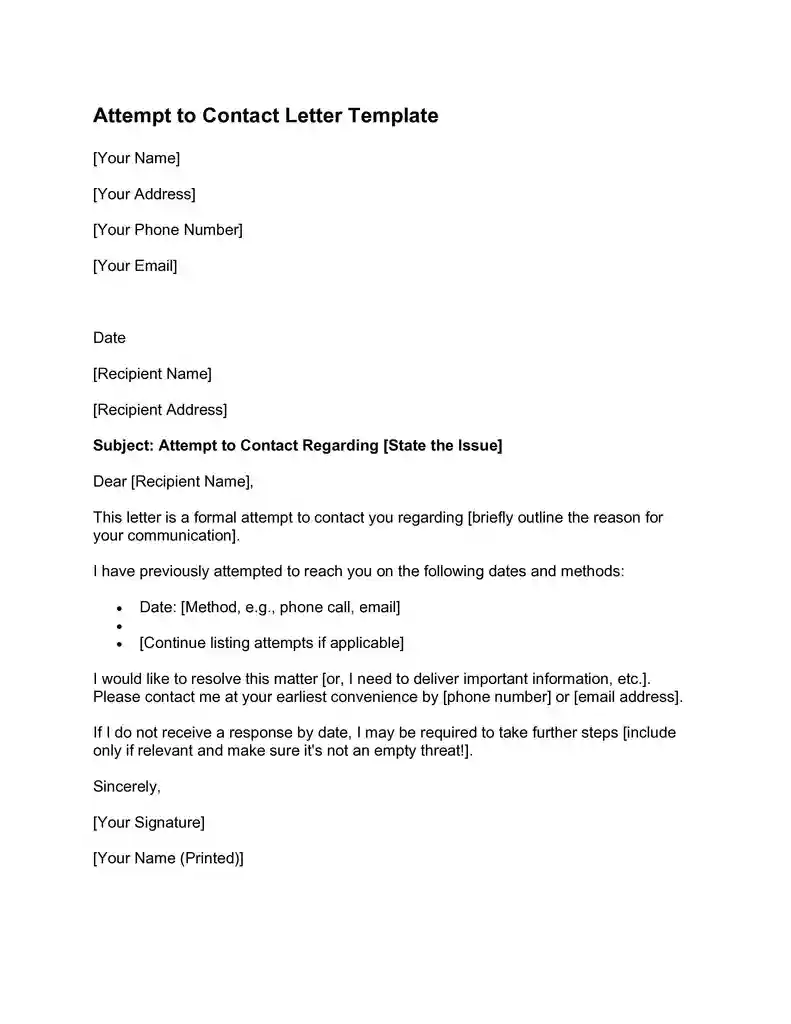
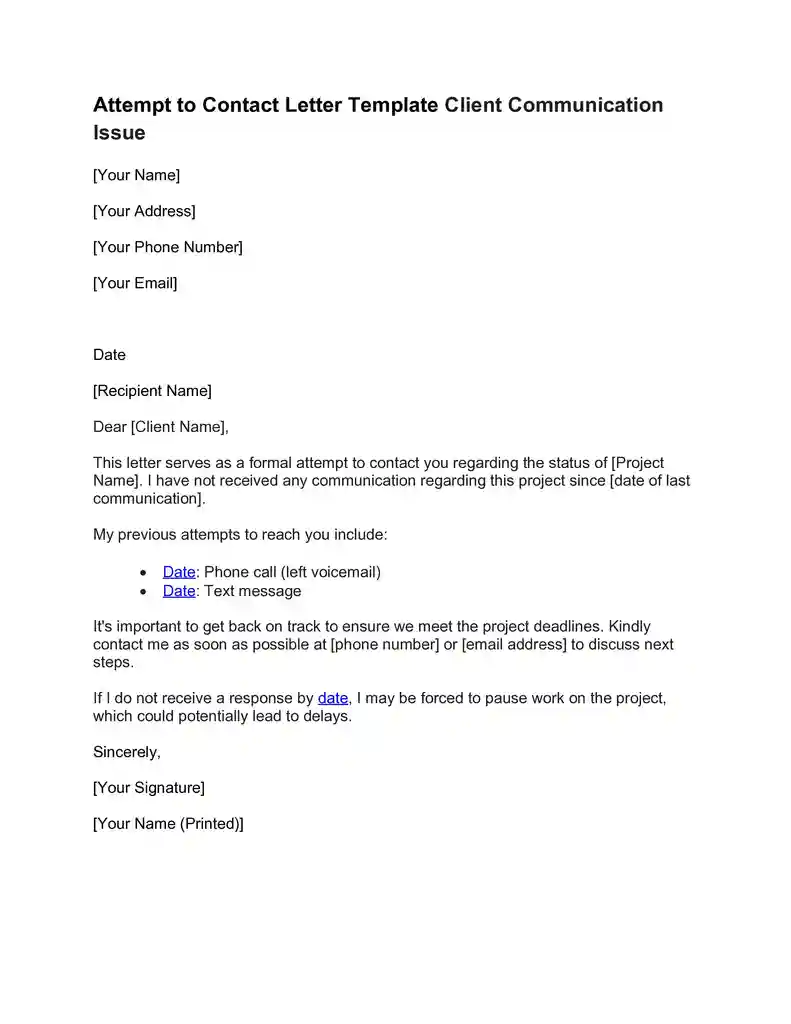
Attempt to Contact Letter Examples
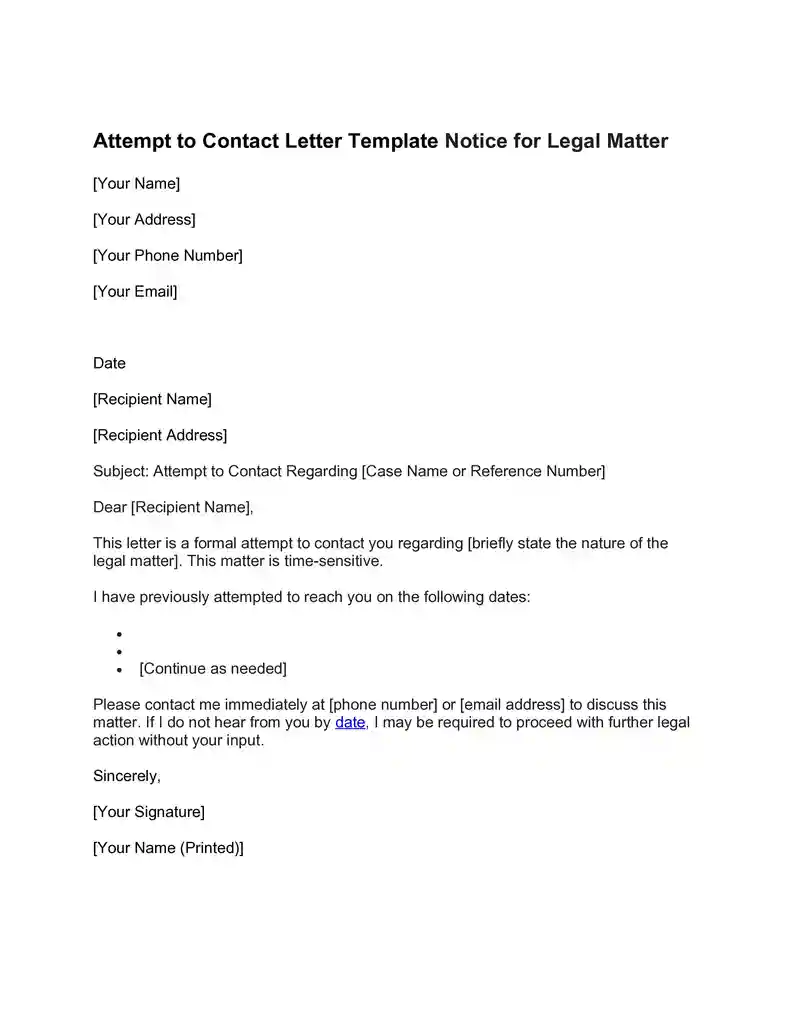
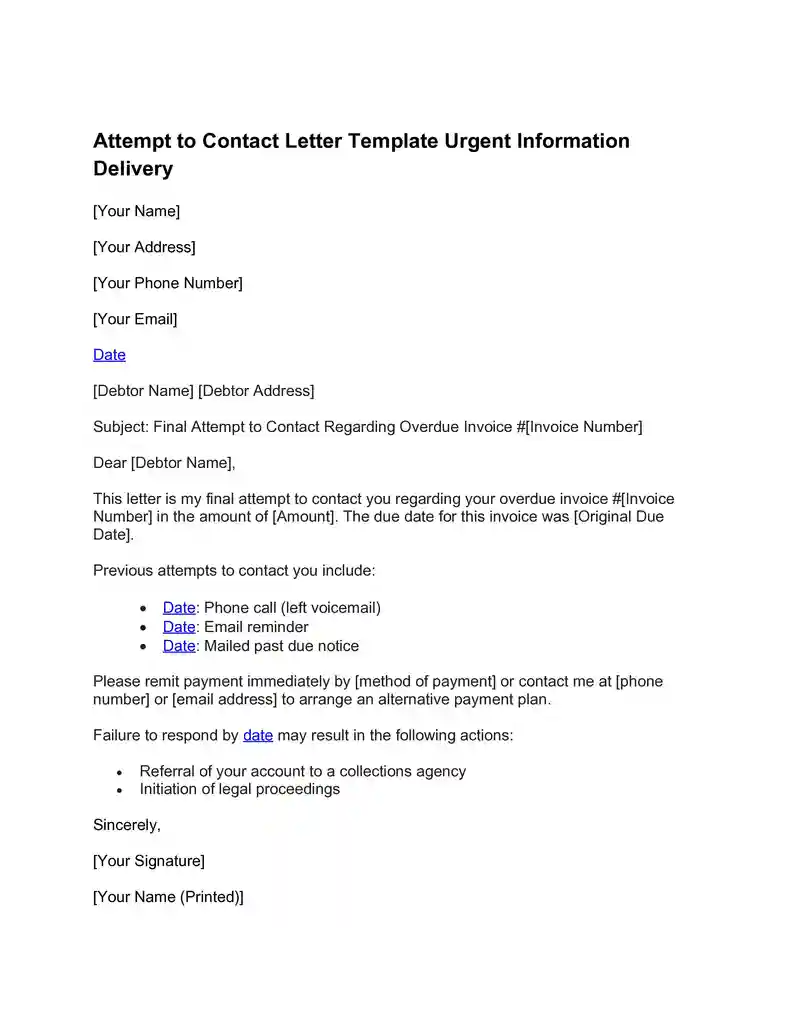
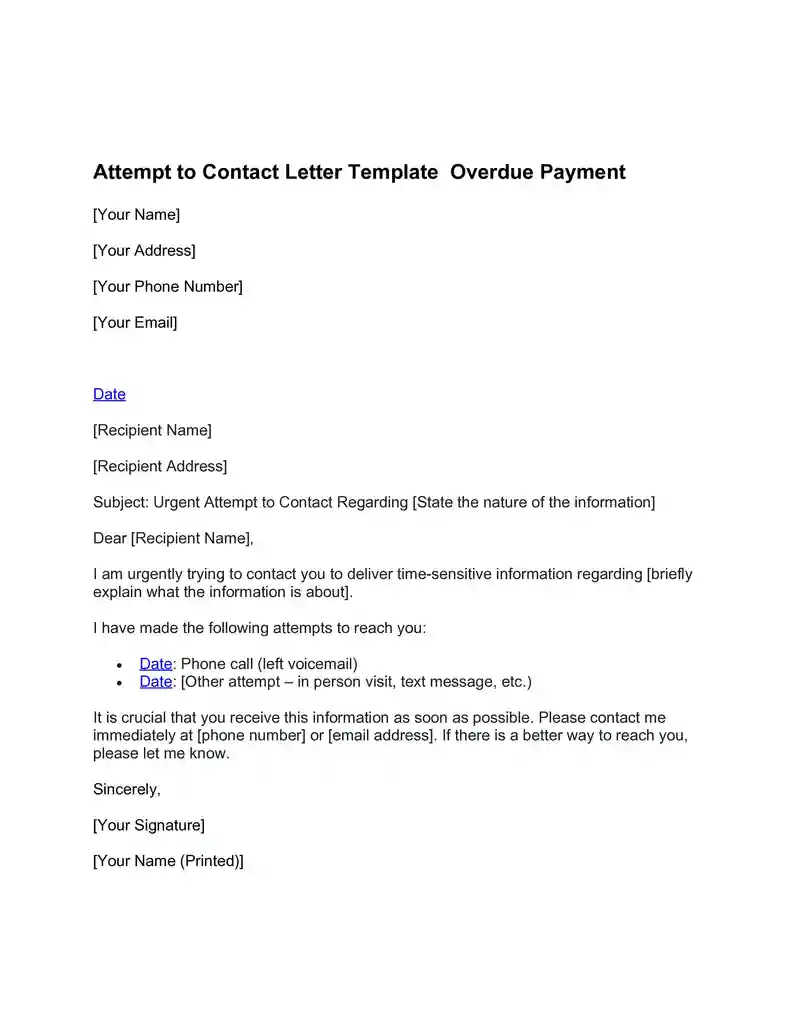
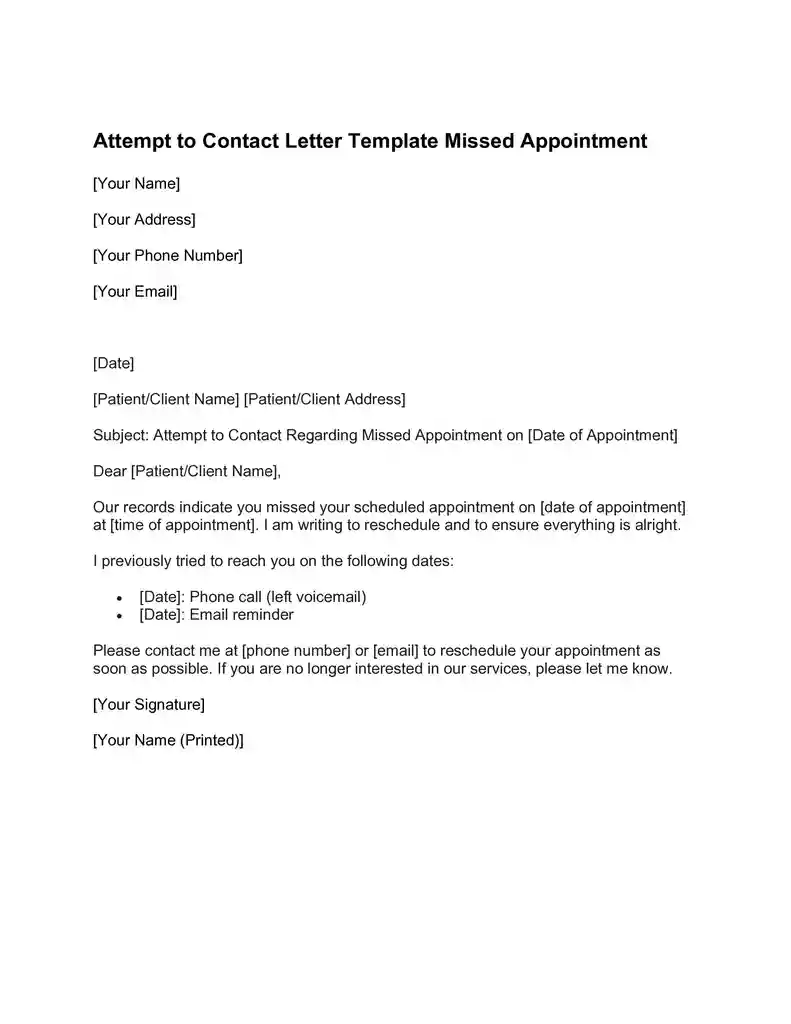
Tips for Tone, Delivery, and Staying Legal
Here is in more detail:
Stay Professional:
Be firm, but not rude. Don’t blame or threaten them.
- Why It Matters: Even if you’re frustrated, staying professional is key. Rudeness or threats can backfire and worsen the situation. It can also damage your position legally if you ever need to take further action.
- Keep it Factual: Stick to the facts – what the issue is, when you tried to contact them before, what you need from them now.
- Avoid Accusations: Don’t jump to conclusions about why they haven’t responded. Phrases like “It seems you’re avoiding me” come off negatively.
- Power of Assertiveness: You don’t have to be a pushover. Be clear about your expectations and the potential consequences of continued non-response. For example: “Please contact me by [date] to resolve this matter. Failure to do so may result in further action.”
How to Send It:
Certified mail (where you get a receipt) is best for important stuff. Email is okay too.
- Certified Mail: This provides legal proof you sent the letter and they received it. It’s vital for issues where you need to document your communication efforts (like some debt collection or potential court cases).
- Email: Acceptable for less critical situations. It’s good practice to follow-up an emailed letter with a phone call to ensure it was received.
- Regular Mail: Can be used, but lacks the proof of delivery the other methods offer.
Know the Laws:
Things can be different depending on where you live, especially when it comes to collecting debts or legal matters.
- Debt Collection: Many places have laws about how and when you can contact someone regarding a debt. These protect debtors from harassment. It’s crucial to know these rules before sending an attempt to contact letter related to money owed.
- Legal Matters: If the matter is tied to a court case, there might be specific procedures for communication and documentation. A lawyer can advise you here.
- Finding Resources: Your local government probably has websites outlining consumer rights or debt collection laws. Legal aid societies can also provide guidance.
What If They STILL Don’t Answer?
It’s frustrating when you’ve put effort into a formal attempt to contact letter and still hear nothing. Here’s how to handle it:
Write it All Down: Keep a super detailed list of every time you try to reach them.
This isn’t just about the initial letter. Every follow-up call, email, or even a visit to their address – note it all down with dates and times. This creates a strong record of your attempts.
What’s Next? This depends. It could mean trying to find them another way, or even taking legal action (but get advice first!).
Here’s a breakdown of possibilities:
- Alternative Contact Methods: Do you have a mutual acquaintance who might have another phone number or address for them? Are they active on social media where you could send a message? Think outside the box while remaining professional.
- Skip Tracing: There are professional services called “skip tracers” who specialize in finding people who don’t want to be found. These usually cost money and should only be considered if the situation is serious enough to justify the expense.
- Legal Action: Depending on the reason for your contact (unpaid debt, a court matter, etc.), the next step might be consulting a lawyer. They can advise on the legality of further action and whether your documented contact attempts are sufficient to proceed.
- Knowing When to Walk Away Unfortunately, there are times when you might have to accept that the person cannot be reached. If the amount of money involved is small, or the matter isn’t extremely urgent, the effort of further pursuit might not be worth it.
Always be aware of the laws in your area. Some jurisdictions have strict rules on debt collection or what constitutes harassment.
Common Mistake And How to Avoid
Let’s dive into common mistakes people make with attempt to contact letters and how to avoid them:
Mistake 1: Overly Emotional Tone
- The Problem: It’s easy to get frustrated when someone is ignoring you, especially if it involves money or an important matter. Letting anger or accusations creep into your letter undermines its professionalism.
- How to Avoid: Focus on being concise, factual, and firm. Stick to outlining the situation, your past contact attempts, and the specific action you now need from the recipient.
Mistake 2: Lack of Specificity
- The Problem: Vague letters saying “I tried to reach you about an important matter” aren’t compelling. The recipient might not take it seriously or even understand what it’s regarding.
- How to Avoid: Be clear about the reason for your contact (unpaid invoice, missed appointment, legal notice, etc.). Include relevant details like dates, amounts, or reference numbers.
Mistake 3: Not Setting a Clear Deadline
- The Problem: If you simply ask someone to get in touch, there’s no sense of urgency. They might put it off indefinitely.
- How to Avoid: Include a reasonable deadline for response. State the potential consequences if your deadline isn’t met (e.g., “If I don’t hear back from you by [date], I’ll be forced to pursue other options.”).
Mistake 4: Forgetting Legal Considerations
- The Problem: There are often regulations, especially for debt collection or formal legal processes. Not knowing these laws can jeopardize your efforts or even get you in trouble.
- How to Avoid: Do your research! If the matter is at all related to debt collection, legal proceedings, or issues where significant timeframes are important (contractual deadlines), consult with an attorney or familiarize yourself with the relevant laws in your area.
Mistake 5: Relying Solely on the Letter
- The Problem: An attempt to contact letter is powerful, but it shouldn’t be your ONLY attempt. It’s meant to document your efforts, not replace them.
- How to Avoid: Use the letter alongside continued efforts to reach the person through other channels (phone, email, mutual contacts, etc.). Keep detailed records of every attempt, regardless of whether it’s successful.
Bonus Tip: Proofread meticulously! Typos, misspellings, or incorrect information instantly makes your letter look less credible.
FAQS
Do I need a lawyer to write an attempt to contact letter?
Not always, but it depends. For simple matters (unpaid invoices, a client who’s gone quiet), a well-written template can suffice.
However, if the issue involves legal proceedings, contracts, potential lawsuits, or significant amounts of money, consulting a lawyer is essential to ensure the wording is correct and protects you.
Can I send an attempt to contact letter by email?
Yes, in many cases it’s acceptable. Email is faster and convenient. However, if you need proof of receipt for potential legal action, certified mail with a return receipt is the more secure option.
What if I still can’t find the person’s current contact information?
There are a few options if standard attempts to locate them fail:
Online Resources: Websites exist for finding people, but use reputable ones and be wary of paying for information that might be outdated.
Social Media: Discreetly checking social media profiles can sometimes reveal a current email or phone number.
Skip Tracing: This involves hiring professionals to locate people, but it can be expensive. Only consider it if the stakes are high.
How long should I wait for a response before taking further action?
There’s no one-size-fits-all answer. Consider these factors:
The Deadline You Set: Did you state a timeframe in your letter? If so, stick to it.
Severity of Issue: Is an unpaid bill more urgent than rescheduling a non-critical meeting?
Legal Requirements: Certain types of notices have legally mandated waiting periods before further steps can be taken.
The person responded but is rude or refuses to cooperate. What do I do?
Unfortunately, the attempt to contact letter doesn’t guarantee a positive outcome. Here’s how to handle it:
Don’t React Emotionally: Stay professional, even if they aren’t. Their behavior could hurt their own case later on.
Document Everything: Save any hostile emails or record the details of rude calls.
Assess Your Options: Can the issue still be resolved, or do you need to escalate it (collections agency, legal action, etc.)?
Consult a Lawyer: If it gets messy, seek legal advice to protect yourself.
Final Thoughts
Attempt to contact letters are proof that you did your part. Being clear and professional makes them even more powerful.
Remember, a good attempt to contact letter proves you did your part. Get our free templates, customize them, and protect yourself in cases of unpaid bills, missed appointments, or legal issues.

The content creator team at calipsotree.com is dedicated to making topics accessible to everyone, with over 9 years of experience in writing and breaking down complex concepts into easy-to-understand articles that answer readers’ financial questions.






